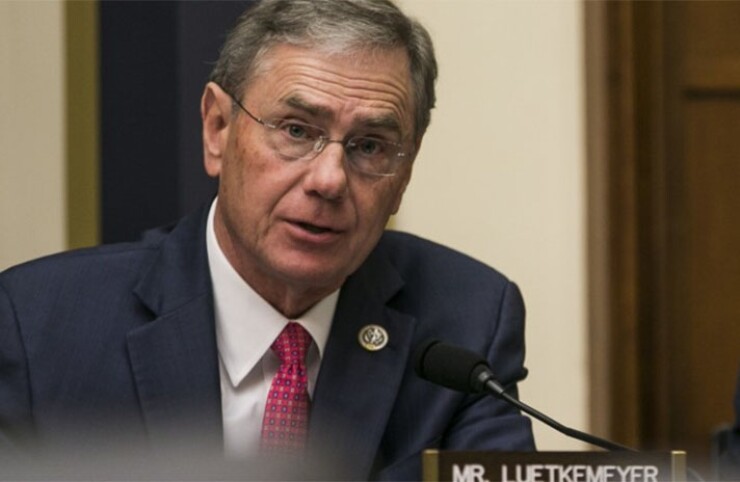It's official.
Five weeks after Vice President Kamala Harris disclosed in a speech that the Biden administration
The SBA has unveiled a proposed rule that would eliminate a 40-year moratorium capping 7(a) participation by small-business lending companies at 14. Two distinct types of SBLCs are envisioned, regular for-profit lenders like the 14 incumbents and most fintechs, as well as nonprofit-mission-based SBLCs that would focus on underserved markets or demographic groups.
SBLCs are nondepository lenders licensed by the SBA.
As a result of the moratorium, in place since January 1982, banks and credit unions have enjoyed a near monopoly on 7(a) lending, which totaled $25.7 billion in the federal government's just-completed 2022 fiscal year. That would change under the proposed rule — albeit slowly.
According to the text of the proposed rule, published Monday in the Federal Register, the pace new SBLCs are licensed will be tied to the SBA's "having adequate staffing and funding to conduct oversight activities and initial screening of applications." The SBA noted in the proposal it has capacity to authorize just three new regular SBLCs based on existing staffing levels; a time frame was not stated.

"SBA seems to recognize the limitations on their resources," said James Ballentine, CEO of Ballentine Strategies, a Washington-based consulting firm. "SBA has not done this for 40 years. It's important if they are to move forward to start this process off extremely slowly. That's something this proposal seems to recognize, that they do not have the resources to oversee a [flood] of entrants into the 7(a) marketplace."
While the SBA implemented the moratorium on nondepository lenders as part of an administrative rulemaking process, and possesses authority to eliminate it without congressional approval, lawmakers are likely to scrutinize the plan, Ballentine said.
"I cannot imagine that this is something that Congress will not at least want to ask very, very tough questions on. Those questions should be asked," said Ballentine, a former longtime lobbyist for the American Bankers Association.
Already, Rep. Blaine Leutkemeyer of Missouri, currently the ranking Republican on the House Small Business Committee, said Monday in a statement that the SBA should be laser focused on safety-and-soundness issues, rather than adding new types of lenders to 7(a).

"The SBA has proven time and again to be ineffective and mismanaged," Leutkemeyer said. "They lack both the infrastructure and expertise to be the only regulator overseeing lenders."
The SBA estimated that it could license seven more SBLCs for each risk management analyst it was able to hire, adding that each new hire would cost about $330,000 in salary, overhead and benefits.
The SBA plans to license more mission-based SBLCs since many of the initial applicants are expected to be current participants in its Community Advantage pilot program. The 11-year-old Community Advantage program is a 7(a) subset that permits nondepository groups, including microlenders, certified development companies and community development financial institutions, to make loans up to $350,000 so long as 60% of their portfolio is dedicated to borrowers in underserved markets.
Fintech lenders have lobbied for access to 7(a) for years. After Harris's Oct. 4 speech at the Treasury Department's annual Freedman's Bank Forum in Washington, they indicated they would be comfortable with a measured approach to licensing new SBLCs.
"As we pursued this initiative for the last couple of years, one of the things we felt was very important was not to make it an all-comers type of thing," Sam Graziano, chief commercial officer for the Chicago-based Amount, said in an interview shortly before the SBA published the proposed rule. "Anybody that wants to lever these programs should meet some type of standard demonstrating that they are a responsible lender, a highly compliant organization."
Response to SBA's proposed rule by bankers and bank groups has been muted so far. The Independent Community Bankers of America "is currently reviewing the rule to ensure it will support policies that enable community banks to continue to effectively serve small businesses," according to a spokesperson for the group.
Nimi Natan, who runs SBA lending for the $3.1 billion-asset Gulf Coast Bank & Trust in New Orleans, wrote in an email that he was "all for" the proposed rule "if it really opens up access to deserving borrowers and it is scalable."
One of the SBA's key goals in opening 7(a) to more nondepository lenders, particularly mission-based SBLCs, is to push more capital to underserved markets and demographic groups. However, Natan added that the agency may have missed an opportunity by not enlisting the thousands of banks and credit unions currently active in 7(a) with programs that incentivized them to lend to underserved borrowers.
"I still think that existing [participants] can make a huge dent in the unfulfilled funding gap with special, targeted programs," Natan wrote.
The SBA will accept comments on the proposed new rule through Jan. 6.







